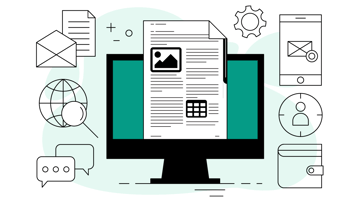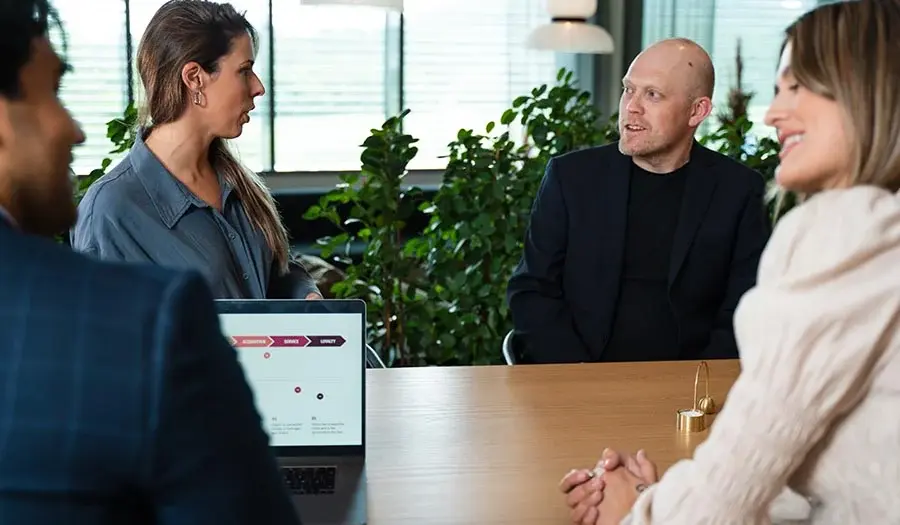In this blog, we’ll explore the key components of a successful team structure that delivers exceptional results and drives your business forward.
What is a Proposal Team?
A dedicated team of managers, coordinators, writers and designers responsible for collaborating with subject matter expert contributors to develop and deliver a compliant, compelling documents that stands out from the competition. Their goal is to recapture existing clients and win new business. In fact, according to APMP, competitive bids influence roughly 30 – 40% of a businesses' sales revenue.
Some teams are internal service providers, managing bids across business units and product lines under an organizational director or marketing. Other teams are embedded in service lines or regional offices. Wherever the team is located within an organization, it is today’s business growth engine across all industries and sectors.
Benefits of a Dedicated Proposal Team
A dedicated team can significantly improve the quality of your content and efficiency of your process.
By focusing solely on RFPs or Tenders, a dedicated team can:
- Improve Efficiency: They have specialized skills and knowledge, and know how to apply best practices for smoother process workflows and fewer bottlenecks.
- Improve Effectiveness: They know how to build collaborative relationships with cross-functional experts to improve quality with fewer delays.
- Improve Productivity: They know how to communicate with intent and purpose, helping experts innovate, problem-solve and stay on deadline.
- Improve Quality: They have specialized experience in the art of written communication, specifically how to engage, inform and persuade decision-makers.
- Improve Morale: They know how to use expert time wisely which boosts morale and passion for working on the next bid.
Suggested content



Common Proposal Team Roles and Responsibilities
The right team is a reflection of your solution, your process, and your goals. You need the right skills to efficiently shepherd your bids through development and submission.
While your dedicated team will vary based on your organization and the size of your bids, the most commonly structured roles include:
- Manager: Developed the win strategy and orchestrates development by defining tasks and deadlines, facilitating information and fostering collaboration.
- Coordinator: Facilitates the development process by coordinating process steps and milestones as well as content with contributors.
- Writers/Editor(s): Weaves expert inputs into a cohesive and persuasive story narrative, and edits the document for accuracy, clarity and impact.
- Graphics Designer: Creates the visual elements, such as layout, branding and compelling visuals that bring context to the content.
- Production Manager: Manages the production and delivery, ensuring the timely delivery of a compliant offering.
You also need the right expertise and diversity of thought at the right time to respond accurately. This is where your cross-functional experts are tapped to join the dedicated team as contributors, or what some organizations consider the “formal” team.
These structured roles include:
- Capture Manager: Develops a strategy for capturing the client, including industry and competitor evaluation and client research and relationship building.
- Subject Matter Expert (SMEs): Responds to solution requirements with in-depth technical expertise and knowledge of the solution and its benefits.
- Project Manager: Responds to the solution project requirements by defining the project scope, plan, team and supporting methodology.
- Pricing: Develops a pricing strategy for the proposed solution and calculates cost estimates to determine the winning price.
- Legal: Identifies legal risks or liabilities, and ensures the document is legally sound and compliant with all relevant laws and regulations,
- Reviewers: Regularly review the document and provide instruction on how to correct accuracy, strengthen your value proposition and boost readability.
- Sales/Business Development: Provides client insights and describes how the solution solves the client’s problem, including potential objections or concerns.
Process Engagement Points for Hitting Deadlines
Team and subject matter expert communication and collaboration is essential throughout the entire development process, but there are certain stages that are particularly critical.
These team milestones, or engagement points, help drive the development process forward:
- Kickoff Meeting: Ensure the team understands how to execute the win strategy and fulfill their roles and responsibilities, milestones and deadlines.
- Solution Innovation: Ensure the team develops the best solution to the client’s problem and reconfirm the value proposition, win themes, benefits and proof points.
- Stand-up Meetings: Ensure the team is on track by discussing progress and status, compliance and quality.
- Reviews: Ensure the bid communicates your message clearly and concisely by focusing on accuracy and readability.
- Submission: Ensure a timely, high-quality submission by allocating time and resources to avoid last-minute scrambles.
- Lessons Learned: Ensure the team is working efficiently and effectively by debriefing development and enhancing team structure and process.
Make the Process Work for Your Dedicated Team
Managing a proposal team is challenging, requiring a delicate balance of organization, communication, and motivation. While the team’s dedication and hard work are essential, creating a supportive and efficient environment is equally important.
By understanding your team’s strengths, weaknesses, and preferences, you can tailor your process to their needs and maximize their productivity and drive better results.
As you consider your team structure, consider these tips:
- Identify Individual Skills: Determine the unique skills and expertise of each team member. Ask, “How can we grow these skills to improve our process?”
- Assess Your Team's Strengths and Weaknesses: Identify where expert content is a struggle. Ask, “How can we bridge these process gaps?”
- Assess Team Dynamics: Evaluate how your team works together, and with experts. Ask, “How can we work together more effectively throughout the process?”
- Redefine Roles and Responsibilities: It’s all hands on deck, and everyone does a little bit of everything. Ask, “How can we cross-train to better support each other and the process?”
- Encourage Feedback: Create a safe space for your team to share their thoughts, ideas, and concerns. Ask, “How can we learn from our challenges and improve?”
- Celebrate Success: Foster a positive work environment by creating a supportive and encouraging atmosphere. Ask, “How can we better acknowledge and motivate the team?”
Make the Process Work for your Experts
APMP reports that for dedicated teams, collaborating with subject matter experts remains the biggest challenge for organizations. Experts have full time jobs, many serving clients, so conflicting priorities and shifting schedules are always going to be a challenge.
When working with subject matter experts, it is essential to create an environment that supports their contributions and maximizes their productivity. Instead of imposing a rigid process on them, consider the following strategies to make the process work for them:
- Consider Workload: Assign tasks based on individual workloads as well as expertise. When you use expert time wisely, they are more likely to prioritize their tasks.
- Create a Flexible Schedule: Build flexibility into your schedule to accommodate unforeseen circumstances. When experts understand the critical priorities, they are more likely to step up and hit their deadlines.
- Establish Quality Standards: Define what a high-quality bid looks like. Annotating your outline gives experts clear guidance on what you expect, and that minimizes revisions. (Experts love that!)
- Encourage Feedback: Conduct de-briefs and lessons learned, as well as one-on-ones. Experts want to talk about team dynamics as well as process.
- Establish Communication Channels: Choose a selection of channels aimed at different types of communicators. Experts aren’t always at their office desks, so a mix of email, text and collaborative management software meets them where they work.
- Implement Reviewer Types: Drill down into what you need from each review and involve specific reviewer types. Experts prefer to focus on a review task, rather than just feedback or opinions. Make reviews even more productive with real-time feedback.
- Celebrate Success: Take a moment to recognize your experts as well as your dedicated team. Acknowledge their contributions - before you kick-off the next bid!
A dedicated team structure is essential for delivering high-quality proposals on time. As your business grows, and the number of bids increases, this team becomes increasingly important to maintaining that growth. With a well-structured, dedicated team, you hit those deadlines with quality content and position your organization for long-term success and growth.
Recommended article: Proposal management guide for teams
Remember, a successful proposal team is more than just a group of individuals working together; it’s a cohesive unit that shares a common goal with the experience and skills to deliver exceptional business results.








